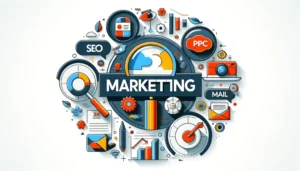The marketing flywheel

The marketing flywheel is a modern marketing framework that focuses on creating sustainable growth for businesses by leveraging the power of customer satisfaction and loyalty. Unlike the traditional funnel model, the flywheel model places emphasis on the continuous improvement of customer experiences, aiming to create positive feedback loops that drive business growth.
In this blog post, we will dive deep into the marketing flywheel, how it works, and why it is important for modern businesses.
The Traditional Funnel vs. The Marketing Flywheel
The traditional funnel model is a linear process that describes a customer’s journey from awareness to consideration to decision-making. In the funnel model, businesses aim to attract as many prospects as possible and then filter them down to a smaller group of qualified leads. The problem with this model is that it treats customers as disposable assets, focusing only on acquisition and not on retention.
The marketing flywheel, on the other hand, is a circular process that continuously feeds into itself, driving growth through customer satisfaction and loyalty. In the flywheel model, businesses aim to create exceptional customer experiences, which in turn generates positive word-of-mouth referrals and repeat business. These positive feedback loops drive growth and create momentum for the business.
The Three Stages of the Marketing Flywheel
The marketing flywheel consists of three stages:
- Attract: In this stage, businesses focus on attracting the right customers through various marketing channels. This includes creating compelling content, optimizing for search engines, and leveraging social media.
- Engage: Once the right customers are attracted, businesses focus on engaging them through personalized experiences, excellent customer service, and ongoing communication. The goal is to build a relationship with customers and earn their loyalty.
- Delight: In the final stage, businesses aim to delight customers by delivering exceptional experiences that exceed their expectations. This includes providing exceptional service, creating a seamless customer journey, and delivering on promises.
Why the Marketing Flywheel Matters
The marketing flywheel matters for several reasons. First, it prioritizes customer satisfaction and loyalty, which are critical for long-term business success. Satisfied customers are more likely to make repeat purchases and recommend businesses to their friends and family. Positive word-of-mouth referrals are powerful and cost-effective marketing tools.
Second, the flywheel model is a more sustainable approach to business growth than the traditional funnel model. By creating positive feedback loops, businesses can generate organic growth that requires less effort and expense than constantly acquiring new customers.
Third, the marketing flywheel is a customer-centric approach to marketing that aligns with the modern consumer’s expectations. Consumers today expect personalized experiences, excellent customer service, and seamless journeys across multiple channels. The flywheel model enables businesses to deliver on these expectations and build long-term relationships with customers.
In conclusion, the marketing flywheel is a powerful marketing framework that emphasizes customer satisfaction and loyalty as the key drivers of business growth. By focusing on creating exceptional experiences for customers and generating positive feedback loops, businesses can achieve sustainable growth and build long-term relationships with customers.



